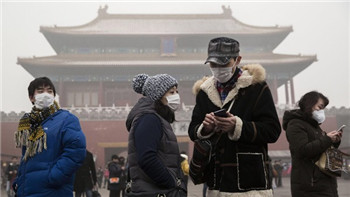亚洲开发银行(ADB,中文简称“亚行”)昨日批准一笔3亿美元贷款帮助治理北京的空气污染。该机构承诺支持中国减少首都及周边地区煤炭使用的努力。
The Asian Development Bank yesterday approved a $300m loan to help clean Beijing’s polluted air as it pledged to support China’s efforts to cut coal use in and around the capital.
北京官方本周首次发布空气重污染红色预警,原因是空气中的微小颗粒物浓度升至危险水平,迫使工厂关闭,许多学校停课。
Beijing officials this week issued their first red alert after particulate readings rose to hazardous levels, forcing closure of factories and many schools.
亚行的贷款将用于削减河北省的煤炭使用,肆虐京津的污染有很大一部分源自该省。
The loan will be used to cut coal use in Hebei province, which contributes much of the pollution that blights Beijing and Tianjin.
北京、天津及周边的河北省生活着1.1亿人,占中国经济总量的10%。
Some 110m people live in Beijing, Tianjin and the surrounding Hebei province, accounting for 10 per cent of China’s economic output.
亚行贷款将支持旨在把河北省每年煤炭消耗量减少逾1200万吨的政策。中国10个污染最严重的城市中,有7个在河北。
The ADB loan will support policies aimed at reducing annual coal consumption in Hebei by more than 12m tonnes. Seven of China’s 10 most polluted cities are in Hebei.
“虽然他们做了很多努力,但污染仍然存在,”亚行发展专家石井晓(Satoshi Ishii)表示。
“Although they are making a lot of effort, the pollution is still there,” Satoshi Ishii, an ADB development specialist, said.
“根本问题是河北以煤炭为基础的经济和产业结构。”
“The fundamental issue is Hebei’s coal-based economy and industrial structure.”
这是亚行首次在中国发放“政策贷款”。传统上,中国政府不愿让海外贷款机构介入关键问题上的政策决定,但中国环境挑战的复杂性突显了采纳外部专业知识的需要。
The package is the first “policy loan” made by the ADB in China. The government has traditionally been reluctant to involve overseas lending agencies in policy decisions on critical issues, but the complexity of the country’s environmental challenges has underscored the need to tap external expertise.
“向中国这样的中上等收入国家提供政策贷款比较少见,”亚行驻华首席代表哈米德∠里夫(Hamid Sharif)表示。
“It is less common to do a policy loan for an upper-middle-income country like China,” Hamid Sharif, ADB’s China country director, said.
“但在中国面临空气污染之类的复杂问题之际,它对政策对话和听取意见抱开放态度。”
“But as China faces complex issues like air pollution, it is open to policy dialogue and inputs.”
省际边界是治理中国空气污染的障碍之一,因为官僚体制内部的地盘之争以及对当地就业机会和经济增长的关切,阻碍了对雾霾笼罩的华北平原采取地区对策。
Provincial boundary lines are one of the hurdles to cleaning up China’s air as competing bureaucratic fiefs, concern for local jobs and economic growth get in the way of a regionwide response on the smog-filled North China plain.
明年即将生效的规则将强制要求成千上万家工厂和发电厂披露排放数据。现行规则只要求中国3000家污染最严重的企业公开披露。
Rules coming into effect next year will force emissions disclosure by thousands of factories, mills and power plants. Current rules only require public disclosure by 3,000 of China’s biggest polluters.
北京环保活动人士马军说:“你需要知道你的邻居在做什么,然后才可以合作。”
Ma Jun, a Beijing-based environmental activist, said: “You need to know what your neighbour is doing before you can work together.”
在昨日的一个新闻发布会上,中国官员强调了区域协调应对的重要性。
At a briefing yesterday, China officials emphasised the importance of a co-ordinated regional response.
“京津冀确实还需要进一步加大合作的力度,”天津市副市长尹海林表示。“一个是要统一行动。”
“Beijing, Tianjin and Hebei need to increase co-operation,” Yin Hailin, deputy mayor of Tianjin, said. “The first thing is to act together.”
今年前10个月,北京关闭或搬迁了315家被视为污染过于严重的企业,并拆除了面积为170万平方米的建筑。
In the first 10 months of this year, Beijing closed or moved 315 businesses deemed overly polluting, and demolished 1.7m sq m of buildings.
北京市副市长李士祥表示:“在这个问题上我们是同呼吸、共治理,大家都应该既有耐心,也有信心。”
Li Shixiang, Beijing’s deputy mayor, said: “On this problem we share a common fate, and must manage it together. Everybody must have patience and faith.”
